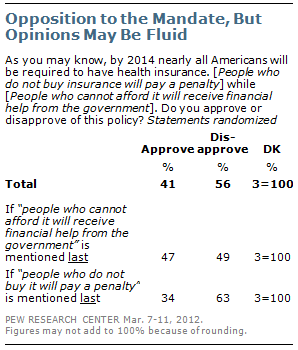I’ve posted about this before but here is a recent and vivid
example. Results of a public opinion
poll cans be shaped greatly by the way questions in the poll are worded. Here is a good and recent example.
The Pew Research Center asked Americans about their support
or opposition to the individual mandate in Obamacare. The results of the poll as reported by Pew
were that 41% of Americans approved of the mandate while 56% opposed. Clearly, Americans are set against the
individual mandate. Right? Not necessarily.
To its credit, Pew reported how results from the poll
changed as a result of changes in the wording.
The question about the individual mandate read as follows:
As you know, by 2014 nearly all Americans will be required
to have health insurance. [People who do not buy insurance will pay a penalty.]
while [People who cannot afford it will receive financial help from the
government.] Do you approve or
disapprove of this policy?
The order of the portions of the question were changed on a
random basis. Sometimes the segment
about the penalty was stated last.
Sometimes the statement about financial help was stated last. The order made a tremendous difference in the
results. When the last thing Americans
heard was that people who did not buy insurance would have to pay a penalty,
only 34% of Americans said they supported the policy, while 63% opposed. However, when the last thing Americans heard
was that people who did not buy insurance would receive financial help to do
so, 47% of Americans supported the policy, while 49% opposed. The results were within the margin of error,
in other words Americans were about evenly split in their support or opposition
to the policy. Here are the results:
Lesson: The wording of interview questions has a great
impact on the result. In other words,
you can’t really gauge the accuracy of the results if you aren’t told the exact
wording of the questions AND whether the pollsters took steps to minimize any
kind of bias in the wording.
Whenever polls results are impacted to such an extent by the wording of the questions, it is a good indication that Americans have not yet formed firm opinions about the issue being polled and that consequently later polls on the subject could yield different results, perhaps quite different results.

No comments:
Post a Comment